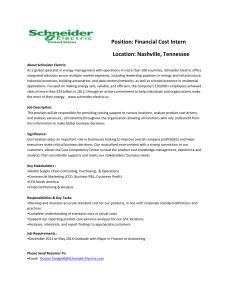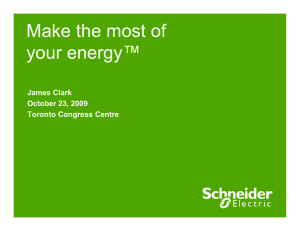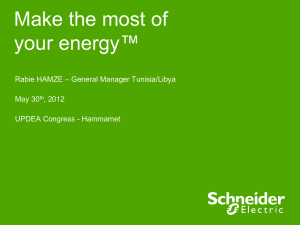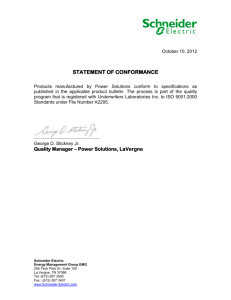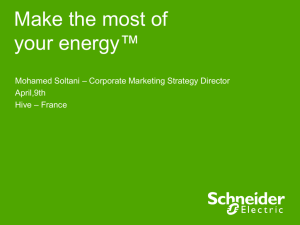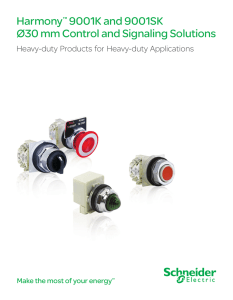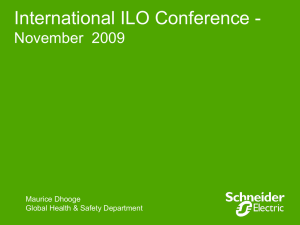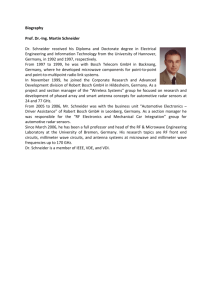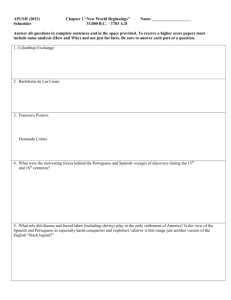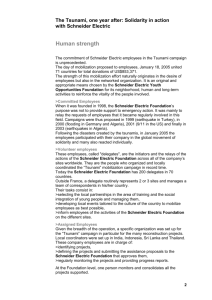Schneider Electric
advertisement
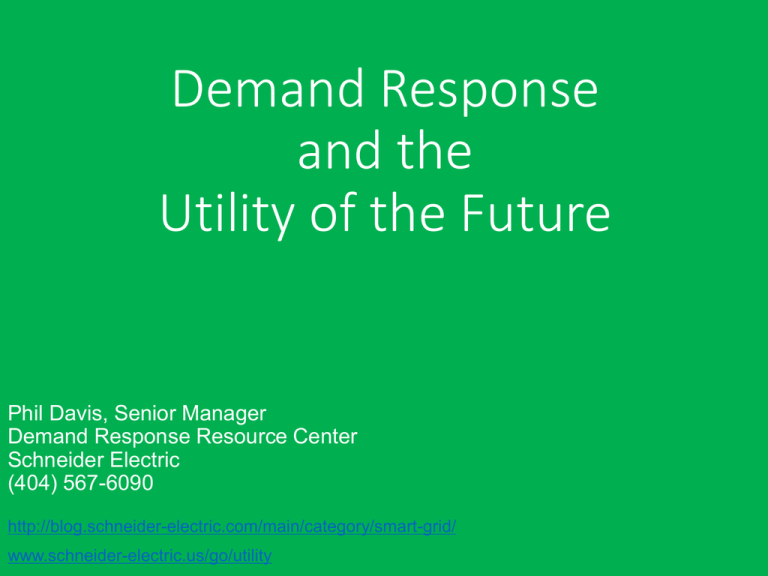
Demand Response and the Utility of the Future Phil Davis, Senior Manager Demand Response Resource Center Schneider Electric (404) 567-6090 http://blog.schneider-electric.com/main/category/smart-grid/ www.schneider-electric.us/go/utility What is “Smart Grid” • A Marketing Term (IEC) • Communications enabled Electric Grid (lots of people) • Interactive (Silicon Valley) • Health Hazard (Tin Hat Crowd) • A Colossal Bore (The Americal Public) • The strongest civilization altering force since sliced bread (me and all the smart people) What is “Demand Response”? US DOE Demand Response Definition: Changes in electric usage by end-use customers from their normal consumption patterns in response to changes in the price of electricity over time, or to incentive payments designed to induce lower electricity use at times of high wholesale market prices or when system reliability is jeopardized. US Federal Position: “It is the policy of the United States that time-based pricing and other forms of demand response….shall be encouraged, the deployment of such technology and devices….shall be facilitated, and unnecessary barriers to demand response participation in energy, capacity and ancillary service markets shall be eliminated.” – US Energy Policy Act of 2005, Sec. 1252(f) What is “Demand Response” Really? Electrons obey the laws of Physics: They travel to ground over the paths of least resistance. Our job is to get them to do a little work along the way without wreaking havoc, which they like to do. Demand Response is how we do that: Everything about an (intentional) electron’s journey is shaped by someone’s desire to accomplish a goal. Those goals are determined by the vast community of electron users; i.e., customers. In that sense, everything a utility does is Demand Response. Now is the time to re-design demand response to meet societal and investor goals of efficiency and environmental stewardship What does Energy Efficiency mean on a Smart Grid? • Envelopes and Distribution are as efficient as possible until the next kWh of savings is more costly than a kWh of generation • Microgrids • Conservation Voltage Reduction • Robust interactivity (device to device or grid to grid) • Efficiency defined outside of economics is doomed to failure Market Drivers Growing pressure on infrastructure Sustainability and Carbon Management Rising consumption Volatile Wholesale Energy costs More ambitious environmental goals Water shortages Fiercer global competition Tighter economic pressure Regulatory demands Complex sourcing options We need to solve these challenges to make the difference! Economic Driver #1: Congestion Economic Driver #2: Reliability Economic Driver #3: Energy Costs Commercial Building Facts: • Owner: Rockefeller Group Development Corp. • Location: 1221 6th Ave, Mid Manhattan NY • Peak Load: 12.5+ MW • Size: 49 stories plus 4 sub floors and “attic” • Tenants: Residential, Data Center, Restaurants, Commercial Offices • Building Automation System – TAC Continuum • DR – Originally enrolled 600kW in NYISO ICAP demand response program Integrated Efficiency Planning ● Environment ● Procurement ● Reporting (SOX) ● Efficiency ● Safety ● Reliability ● Stability From Left Field: The Utility of the Future Distributed Operator Capital Asset Manager Monolithic Central Plant One Way Silo’d Functions Spends Money to Make Money Efficient Operator Automated Customer Engaged Banker Serves Customers to Make Money Inevitable Changes • Infrastructure and service, not energy, become revenue drivers • Electrical attributes become the products • Regulatory regime changes • Distributed energy sources and microgrids • Key Standards adoption=business efficiency • Load shapes will matter Designing for today’s energy environment will limit the life of business investments Energy Efficiency=Economic Efficiency THANK YOU! Phil Davis Schneider Electric Phil.Davis@Schneider-Electric.com 404-567-6090 1999 Groupe Schneider becomes Schneider Electric, focused on Power & Control Power & Control 1996 Modicon, historic leader in Automation, becomes a Schneider brand Steel Industry 1991 Square D joins Groupe Schneider 1988 Telemecanique joins Groupe Schneider 1836 Creation of Schneider at Le Creusot, France 19th century 1975 Merlin Gerin joins Groupe Schneider 20th century 2008 Acquisition of Xantrex, leader in renewable energy solutions 2007 Acquisition of APC corp. Energy Management 2003-2008 Targeted acquisitions in wiring devices and home automation (Lexel, Clipsal, Merten, Ova, GET, etc.) 2005 Acquisition of Power Measurement Inc. 2003 Acquisition of T.A.C 2000 Acquisition of MGE UPS Systems 21st century
